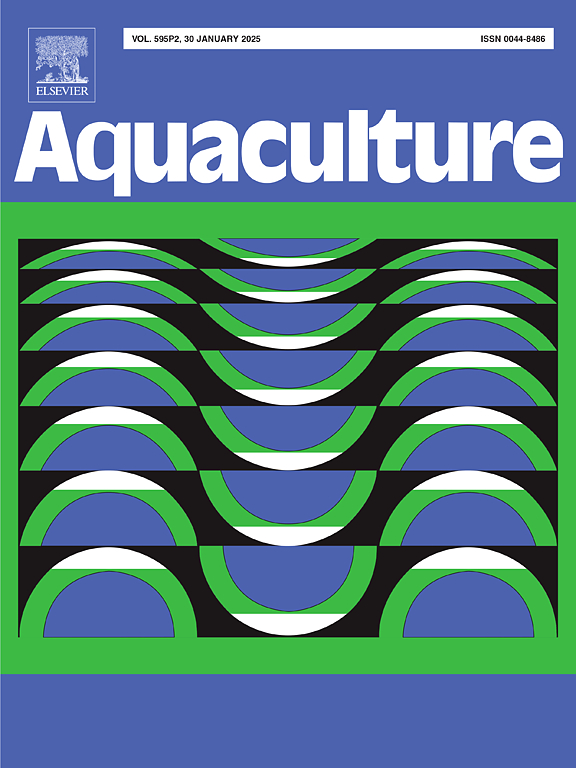MAPK/ERK-driven transcriptional regulation mediates divergent thermal tolerance in two congeneric oyster species
IF 3.9
1区 农林科学
Q1 FISHERIES
引用次数: 0
Abstract
Oysters, globally distributed filter-feeding bivalves, are ecologically and economically vital, yet summer mass mortality events due to global warming threaten their sustainable development. ERK1/2 function as a phosphorylation-activated molecular switch in MAPK pathway, transducing thermal stress signals via nuclear translocation and transcription factor interaction to regulate thermotolerance-related genes expression in oysters. In this study, we comprehensively investigated the transcriptional regulatory role of ERK kinase in oyster thermotolerance through combined treatment with ERK kinase inhibitors and heat stress, integrated with RNA-Seq and physiological/biochemical assays. Our data demonstrate that ERK, under heat stress, activated phagocytosis (Drpr, Sqstm1), coordinated intricate pathway cross-talk among PI3K-AKT pathway, mTOR pathway, and NF-ĸB signaling pathway (Fos, Trpm2, Pik3ca), inhibited apoptosis (Birc3, Bax, Bcl-2), and optimizing energy conversion processes (HK, PK, C1qtnf3, Fasn). The integrated transcriptomic analysis of Crassostrea gigas and Crassostrea angulata further confirmed the critical role of ERK-regulated genes in thermal adaptation. This study elucidates the transcriptional regulation network of MAPK/ERK pathway in oyster thermotolerance, and advancing our mechanistic understanding of heat resilience in marine invertebrates. Meanwhile, the identified molecular regulators provide actionable targets for breeding heat-resistant oyster strains, offering a dual foundation for both ecological conservation and sustainable oyster aquaculture in the context of global warming.
MAPK/ erk驱动的转录调控介导两种同类牡蛎的不同耐热性
牡蛎是全球分布的滤食性双壳类动物,具有重要的生态和经济价值,但全球变暖导致的夏季大规模死亡事件威胁着牡蛎的可持续发展。ERK1/2是MAPK通路中磷酸化激活的分子开关,通过核易位和转录因子相互作用传导热应激信号,调控牡蛎耐热性相关基因的表达。在本研究中,我们通过ERK激酶抑制剂和热应激联合处理,结合RNA-Seq和生理生化分析,全面研究了ERK激酶在牡蛎耐热性中的转录调控作用。我们的数据表明,ERK在热应激下激活吞噬(Drpr, Sqstm1),协调PI3K-AKT通路,mTOR通路和NF-ĸB信号通路(Fos, Trpm2, Pik3ca)之间复杂的通路串导,抑制细胞凋亡(Birc3, Bax, Bcl-2),并优化能量转换过程(HK, PK, C1qtnf3, Fasn)。长牡蛎和角牡蛎的整合转录组学分析进一步证实了erk调控基因在热适应中的关键作用。本研究阐明了MAPK/ERK通路在牡蛎耐热性中的转录调控网络,促进了我们对海洋无脊椎动物耐热性机制的认识。同时,所鉴定的分子调控因子为牡蛎耐热品系的选育提供了可操作的靶点,为全球变暖背景下的生态保护和牡蛎可持续养殖提供了双重基础。
本文章由计算机程序翻译,如有差异,请以英文原文为准。
求助全文
约1分钟内获得全文
求助全文
来源期刊

Aquaculture
农林科学-海洋与淡水生物学
CiteScore
8.60
自引率
17.80%
发文量
1246
审稿时长
56 days
期刊介绍:
Aquaculture is an international journal for the exploration, improvement and management of all freshwater and marine food resources. It publishes novel and innovative research of world-wide interest on farming of aquatic organisms, which includes finfish, mollusks, crustaceans and aquatic plants for human consumption. Research on ornamentals is not a focus of the Journal. Aquaculture only publishes papers with a clear relevance to improving aquaculture practices or a potential application.
 求助内容:
求助内容: 应助结果提醒方式:
应助结果提醒方式:


